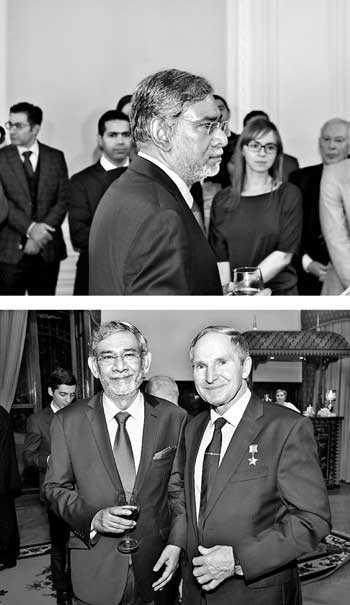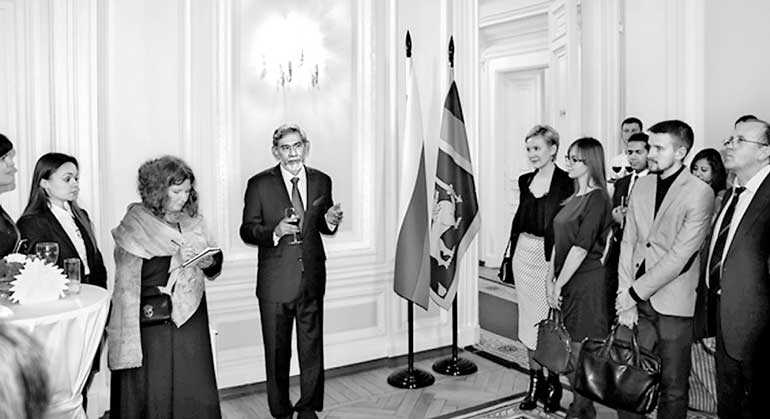Tuesday Feb 24, 2026
Tuesday Feb 24, 2026
Saturday, 10 November 2018 00:00 - - {{hitsCtrl.values.hits}}
 The residence of the Sri Lankan Ambassador to Russia opened its doors in the evening of 7 November, for the first official reception hosted by Dr. Dayan Jayatilleka for Russian guests representing a number of Sri Lanka-Russia partnership areas. The presentation of the Ambassador’s Credentials to President Vladimir Putin was the primary occasion of the event; however, the special choice of the date was symbolic.
The residence of the Sri Lankan Ambassador to Russia opened its doors in the evening of 7 November, for the first official reception hosted by Dr. Dayan Jayatilleka for Russian guests representing a number of Sri Lanka-Russia partnership areas. The presentation of the Ambassador’s Credentials to President Vladimir Putin was the primary occasion of the event; however, the special choice of the date was symbolic.
In his welcome remarks, Ambassador Jayatilleka highlighted 7 November as the date of the Russian Revolution which, 101 years ago, gave momentum to worldwide geopolitical processes and, along with Russia’s victory over Nazism in 1945, propulsed important processes in the human history, including the weakening of the colonial system and establishment of national sovereignty in a number of countries, including Sri Lanka.
The fine halls of the Ambassador’s Residence, decorated with red carnations, a symbol and tribute to Russia’s revolutionary history, welcomed representatives of a range of Parliament, Government, social, trade and intelligentsia circles. Among them, the leaders of the renascent Russia-Sri Lanka Friendship Society gathering cosmonauts and senators, strong representation of defence sector including the United Aircraft Corporation overarching Russia’s major aircraft engineering works, and representatives of Government bodies which are key to the focal areas of SL-R cooperation. To name just a few, Rosselkhoznadzor, the Russian surveillance authority ensuring the quality of fish and seafood imports from Sri Lanka as well those of spices and tea; the Ministry of Science and Higher Education which, over the years, has been providing important and timely assistance to the Embassy in placing Sri Lankan students in leading Russian universities.
The Russian guests underscored further potential of interaction in a spectrum of areas including tourism, research, humanitarian and confessional relations. This went in line with President Putin’s expectation to strengthen Russia-Sri Lanka cooperation, as he had noted in his Kremlin speech when receiving the Ambassador’s Letters of Credence. Addressing the guests, Ambassador Jayatilleka expressed hope that the current political changes in Sri Lanka would drive to further reinforcement of cooperation with Russia.
The reception was accompanied by an impressive music program courtesy of Jazz Passage Quartet which had participated in the celebrations of International Jazz Days established thanks to the initiative of Dr. Jayatilleka, then the Sri Lankan Ambassador in Paris. The event flew into a highly-complimented buffet dinner where the inventive menu ‘modern Russian fusion’ recipes with the brightness of Ceylon spices and delicateness of coconut products coming straight from Sri Lanka.
Following is the speech made by Ambassador Jayatilleka at the event.
I am honoured to represent my country in the Russian Federation at this point of the world’s history, and may I assure that the sentiments of the people of Sri Lanka stand with you in this complicated moment in global politics and world affairs. It will be a mistake from my part, if I do not speak a few words about the complex situation in Sri Lanka, which you may be curious about, and even may be concerned about.
It is not difficult to understand what is happening today in Sri Lanka if you look at it from the point of view of your own experience and the experience of the world at least from the 1990s onwards. From your own experience you know that there were certain tendencies that prevailed in Russia in the 1990s, which were going in a certain direction but the Russian people decided to make a course correction and to return to the path that is mostly suited to the national and the state interests of Russia.
We have been going through a similar experience ourselves. And now there is a moment of political complexity, even political tension, political struggle between these two tendencies that you experienced in the 1990s and at the dawn of the 21st century. We are seeing in Sri Lanka today certain efforts on the part of certain players, which remind us of what happened during the so-called coloured revolutions, and the so-called Arab spring.
And we are unhappy at some of the voices we hear from our friends in certain parts of the world because there are very clear policy prescriptions made from certain capitals of the world. There are some who actually have media conferences, way across the oceans and tell us, tell our elected President, what he should do and when he should do it. But since we live in the time where there are voices which tell your President what should be done in your country, we are not surprised that there are those who try to tell us and our elected President what we should do in our country. These are the same voices. Sri Lanka will not allow itself to be drawn in to an attempt to retain a declining global hegemony.
We hear voices of our friends saying that the views of the elected representatives should be heard but these voices forget that the highest elected representative in our country is the executive President who would be elected by the country as a whole and can the take the office if he or she has over 50% of the vote.
The President visited Russia last year and had a very successful meeting with President Putin, whom he had made it publically known was his favourite world leader. I must acknowledge the role of my predecessor Dr. Saman Weerasinghe, who is with us this evening and who made that meeting possible, and it was a success.
I must also make a fundamental point that this re-allying is actually the re-convergence of our President and the new Prime Minister. This re-convergence is the re-convergence of the broadest political forces which among other things have the same strong friendly views towards the Russian Federation and the President of Russia. And those who have been displaced are those who have residues of Russophobia and Sinophobia.
I am very convinced that anything that has been retarding the pace of our agreements and bilateral cooperation will now be removed, and once this crisis is settled, we can move forward in accordance with agreements we have signed at a much faster pace, and with greater political cohesion. We are very grateful as a people, and a state, that the Russian Federation at this moment, and any other moments, has never told us what to do in our own country. Russia always respected us, and helped us protect our national independence, our national sovereignty, our territorial integrity, and our unity.
At one level this evening gathering is a conventional, traditional event which is the first presentation I am hosting since the presentation of the credentials to President Putin. But we decided very clearly to have this event on 7 November for a very specific reason. The reason is that whatever one’s ideological orientation and sympathy may be, history cannot be forgotten. And we, in Sri Lanka, are deeply grateful to Russia for more reasons than one. Those friends of mine, who are here today, and who served in Sri Lanka, would know the emotional ground with which Russia is regarded in my country.
I served as Ambassador in France, and France is quite rightly proud of its contribution to human thought. But as a political scientist by training, I know that Russia has contributed a great diversity of ideas in every field related to human thought. And this contribution has not been purely ideological, purely intellectual; the Russian contribution has been translating its contribution into action. And 7 November, is one of the most important days in the modern human history, so that is the reason why we have chosen to have this celebration here.
The contribution of Russia, which we in Sri Lanka recognise, was far before and beyond 7 November 1917. We are very conscious that if not for the major predominant role played by Russia and the Red Army in defeating the fascism, countries such as ours, would not have achieved independence through the weakening and the collapse of the old colonial order. Few peoples of the world, few nations have contributed so much to humanity in the impact beyond their borders, as has Russia. This is why we shall always be grateful to Russia.
I’m particularly proud and happy to be here this time for another reason. Apart from Russia’s contribution in terms of ideology and in terms of affecting the world’s history, there is at least one, if not more, area of the contribution (and I do not speak about science and technology because it is not a lecture), but in terms of the role of individual leaders in the world’s history, you’ve made a great contribution. For my generation and preceding generations of my father, my grandfather, Russia is identified with at least two great leaders. And now, we in the Global South, and humanity in general, are thankful that you, the Russian people, have chosen the third such leader.
